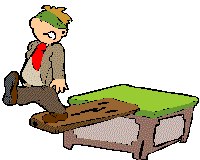Crock of Gold
 At this remove it is easy to forget how grave was the state of the Irish economy in the mid 1980s. The balance of payments, and more starkly the budget deficits, had got to such a stage that the population at large became acutely conscious that something was very wrong and if nothing was done about it the consequencess would be dire.
At this remove it is easy to forget how grave was the state of the Irish economy in the mid 1980s. The balance of payments, and more starkly the budget deficits, had got to such a stage that the population at large became acutely conscious that something was very wrong and if nothing was done about it the consequencess would be dire.Government, employers and trade unions made a pact which involved serious expenditure cuts and wages restraint. The public bought into this - though many of them may feel duped today in the light of what their betters are now seen to have been up to at the time. Nevertheless it was a huge national effort which subsequently endured through various wage/partnership deals up to this day, though it now looks like finally disintegrating in the face of increased wealth, structural change and newly emerging levels of exploitation of labour, particularly immigrant labour.
A number of editions of the Late Late Show dealt with the topic at the time. I remember one in particular where Nuala � Faol�in offered her views on the rapidly escalating national debt which was threatening to consume us all. The debt had reached an enormous proportion of the national income, and worse, was rising. The economic and financial graphs were going off the screens. The IMF was lurking in the wings. What were we to do?
Nuala had a very simple take on the debt, and one which was probably held by the normal intelligent layperson of the day.
- nobody asked her permission to put the country into debt
- she personally was not in debt
- if we owed money to the gnomes, could we not pay it back in instalments
This sounded blindingly obvious and sensible, but it was a million miles short of the reality. I remember thinking to myself at the time that it would make a wonderful question in an economics exam. Reproduce the three statements above and get the candidate to discuss them. There are a few (real) PhDs lurking in the answers.
Let's look at them, one by one:
- Permission: Ireland is a democracy and if the elected politicians (government) pursued policies which put the country into debt, then this must be taken as having the consent, if not enthusiastic endorsement of the public. Even those who might not have voted for the Government[s] in question must be assumed to have signed up to the democratic system in force. The two oil crises of the period should not be forgotten here. The debt was largely incurred as a result of a refusal to accept the drastic fall in living standards which would otherwise have occurred in the short term. It was also contributed to by [an] election manifesto[es] which increased expenditure and reduced the tax base in pursuit of votes.
- Personal debt: while Nuala may not have been personally in debt, it could be argued that her employer (then, I think, the Irish Press) had benefitted, in the short term, from the borrowing, insofar as this maintained demand, including for the newspaper. So Nuala was further indirectly implicated in the debt through this mechanism.
- Payback: however, the most blatant point of contention concerned the gnomes (of Zurich!). Nuala felt they should have been prepared to accept repayment of the debt in instalements, and no doubt they would have been. But the actual position was that there was no question of any repayment. The debt was rising, not only in absolute terms, but as a proportion of national income.
 What all this illustrates is a lot of confusion about the nature and extent of the debt problem even among the more enlightened members of the public.
What all this illustrates is a lot of confusion about the nature and extent of the debt problem even among the more enlightened members of the public.Fortunately for us the question was addressed and the economy today is in a much healthier position than it was then. Many may feel aggrieved at how the burden of adjustment was distributed then, and it could be argued that the economy today faces equally serious challenges. However, we are now operating from a much stronger base and our future is in our own hands.